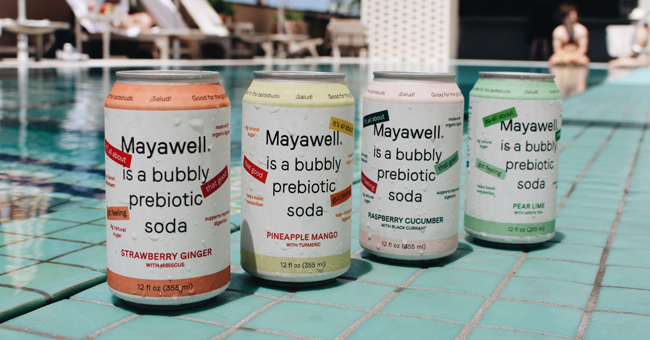Prebiotic soda brand Mayawell has raised $2 million through seed funding led by Mexico-based distillery, Casa Armando Guillermo Prieto, to expand distribution throughout Texas, California and Florida as well as introduce a new flavor and packaging with a lower carbon footprint.
How Did Mayawell Get Here?
Launched in 2019, Austin-based Mayawell came to life rapidly when co-founders Vicente Reyes and Oliver Shuttlesworth were introduced by a mutual friend. Reyes and his team of researchers had been studying the health benefits associated with agave for five years at the time he met Shuttlesworth, who had been inspired to explore the agave beverage space after sampling a traditional Mexican fermented drink, pulque.
According to Reyes, using agave as the active ingredient in Mayawell products helps consumers retain up to 60% of healthy gut bacteria because of the wide variety of probiotic strains it is able to positively interact with, unlike other prebiotics. The product also provides a single daily serving of fiber without causing negative side effects such as stomach irritation, indigestion and bloating.
Mayawell sodas contain less than 40 calories and four grams of sugar in each 12 oz. can and are available in Pineapple Mango, Pear Lime, Strawberry Ginger and the recently launched Raspberry Cucumber. The product, which retails for $34.99 per 12-pack, entered Texas-area Whole Foods stores just weeks before the pandemic hit. Since then, Shuttlesworth said, the company has been learning how to drive growth without traditional methods of store demos and field staff.
What happens now?
The company is planning to open a pop-up retail location in Austin that will run from June to October. Mayawell also plans to amplify its marketing and D2C distribution strategies. About 40% of their current sales are online, from the brand’s website and Amazon – a driving factor behind the transition from glass bottles into cans as it reduces the hassle and limitations of shipping. Mayawell has also moved to an Austin-based co-packer from their previous one based in Massachusetts.
“Being fully local, especially with those retailers [Whole Foods and Central Market], and as we look towards HEB in the next few months, all of those things are important to being a truly Texan-homegrown brand,” said Shuttlesworth. “Now we feel like we have all the operations centralized here, we have always wanted to develop the product as Austin-based so now everything is here including the co-packer,” added Reyes.
According to a press release, the brand will also expand wholesale distribution across Texas and into Florida and Southern California. The company has also used the funding to hire a marketing manager and plans to add a handful of sales and operational positions. However, Shuttlesworth said the main focus is to amplify Mayawell’s marketing and brand message through D2C sales and on-premise accounts with ingredient-driven chef partners. Although they’ve had conversations with a few celebrities, Reyes jokes they have a more powerful advocate: “We are reliant on the deity, Mayawell, so a deity instead of a celebrity at the moment.”
Mayawell marks the first investment in a non-alcoholic agave beverage for Oaxaca-based mezcal distillery Casa Armando Guillermo Prieto (CAGP). The distillery is Mayawell’s lead investor and both Reyes, who sold his mezcal brand portfolio to the distillery a decade prior, and Shuttlesworth said they hope to continue to develop the product with CAGP moving forward. The Coca-Cola Company was an investor in the construction of the facility in 2008, and it briefly served as a bottling operation before shifting to mezcal production. The soda giant retains a stake in the new operation.
What does it mean?
The prebiotic soda beverage space is still a relatively niche category. However, consumer interest in functional beverages continues to rise; according to market research group SPINS, sales of functional beverages with gut health ingredients increased 6.3% in 2020. Prebiotic sodas may outpace kombucha and drinking vinegar in the functional gut-health category as consumers look to more palatable options.
Other prebiotic soda brands such as Olipop and Poppi have helped shape the emerging market, with the former making gains at chain retailers such as Publix (Southeast region) and the latter closing a $10 million investment round last year.
According to Shuttlesworth, Mayawell was the first product of its kind to use agave as an active ingredient, which he says sets them apart from other prebiotic sodas (Poppi recently began incorporating agave). For now, Mayawell will focus on establishing itself among consumers in the Austin community.
“Even in the face of COVID we have been able to grow very steadily,” said Shuttlesworth. “Our focus is really on driving velocity versus expanding store count and so focusing on fewer, better and going deep rather than wide right now.”
